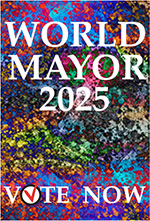

FRONT PAGE
About World Mayor
 

• THE 2014 WINNERS
• THE 2014 PROJECT
• WM HISTORY
• World Mayor winners from 2004 to 2014
• The 2014 shortlist
• The 2014 longlist
• Code of Ethics
• The World Mayor Prize

• Mayor of Calgary debates
• Mayor of Ghent debates

For Mayor of Belo Horizonte
For Mayor of Bordeaux
For Mayor of Bristol
For Mayor of Calgary
For Mayor of Ghent
For Mayor of Guatemala City
For Mayor of Houston
For Mayor of Iloilo City
For Mayor of Izmir
For Mayor of Jeddah
For Mayor of Jena
For Mayor of Lampedusa
For Mayor of Liverpool
For Mayor of Mangaung
For Mayor of Monteria
For Mayor of Oklahoma City
For Mayor of Ribera de Arriba
For Mayor of Sucre
For Mayor of Surabaya
For Mayor of Thessaloniki

The 2012 results
The 2012 project
The 2012 shortlist
The 2012 long-list
World Mayor Prize winners exchange letters

The 2010 results
The 2010 project
The 2010 finalists
Marcelo Ebrard says thank you
Mick Cornett says thank you
Helen Zille and Marcelo Ebrard exchange letters

The 2008 results
The 2008 project
The 2008 finalists
The World Mayor Award
Helen Zille thanks supporters
Mayors of Melbourne and Cape Town exchange letters

The 2006 results
Methodology
The 2006 finalists
The World Mayor Award
Dora Bakoyannis congratulates John So

The 2005 results
Contest methodology
List of finalists
Winning mayors write
Mayor Rama writes - Mayor Bakoyannis replies

The 2004 contest
List of all 2004 finalists
Edi Rama wins 2004 award
People ask - Edi Rama replies

Front Page
Site Search
About City Mayors
|
|
The winners of the
World Mayor Prize
from 2004 to 2014
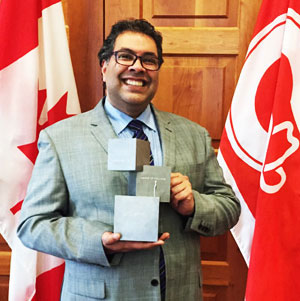 Naheed Nenshi, Mayor of Calgary, Canada, awarded the 2014 World Mayor Prize Naheed Nenshi, Mayor of Calgary, Canada, awarded the 2014 World Mayor Prize
Calgary Mayor from 2010 to date: Mayor Naheed Nenshi, the winner of the 2014 World Mayor Prize, is the most admired mayor of any large Canadian city. His vision how a city should plan for its future has attracted the attention of urban thinkers from across North America. Since taking office in 2010, he has become the most admired mayor of any large Canadian city. He is an urban visionary who doesn’t neglect the nitty-gritty of local government. For many in North America and indeed Europe, Mayor Nenshi is a role model for decisive management, inclusivity and forward planning. He has also demonstrated strong leadership during disasters like the Alberta floods of 2013 and last year’s power outage, which affected large parts of the downtown area of the city. While Mayor Nenshi rejects being labelled progressive or indeed anything else - in the World Mayor interview he said: “I really believe that this kind of categorization alienates people and keeps them from participating in the political process.” – he has not shied away from challenging conservative views from some members of Alberta’s provincial government.
In 2010 Naheed Nenshi became the first Muslim mayor of a major North American city after his ‘Purple Revolution’ captured the imagination of voters from right across the political spectrum. Some six weeks before the 18 October 2010 elections, opinion polls only credited Naheed Nenshi with eight per cent support but extensive use of social media combined with tireless door stepping - his supporters even organised coffee parties in their homes where Nenshi explained his vision - propelled him to victory on election day. Three years later the Mayor was re-elected with almost three quarters of votes cast. MORE
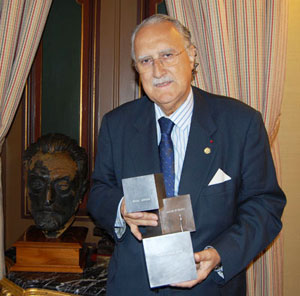 Iñaki Azkuna, Mayor of Bilbao, Spain, awarded the 2012 World Mayor Prize Iñaki Azkuna, Mayor of Bilbao, Spain, awarded the 2012 World Mayor Prize
Bilbao Mayor from 1999 to 2014: When in the early 1990s Bilbao decided to spend almost US$230m of public money on a museum for modern art, many doubters accused the city of squandering precious resources. But developments since then have silenced the critics. Annual visitor numbers to the city increased from 100,000 before the museum’s opening to more than 700,000 in 2011. The Guggenheim is estimated to have contributed some €2.4 billion (US$3.1bn) to the Basque Province’s GDP since October 1997.
Since his election, Mayor Iñaki Azkuna used the high profile of the Guggenheim Museum, designed by architect Frank Gehry, to rebuild the city. The Bilbao Guggenheim has become as iconic as the Sydney Opera House.
Unlike most cities in Spain and Europe, Bilbao is virtually debt-free. During the years of prosperity in the early part of this century, the city, under the administration of Iñaki Azkuna, steadily reduced its debt until it was paid off in 2011. Iñaki Azkuna died in March 2014. MORE
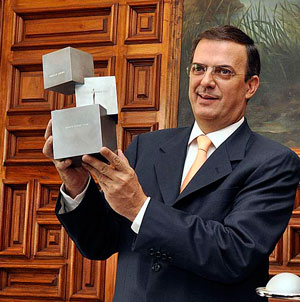 Marcelo Ebrard, Mayor of Mexico City, awarded the 2010 World Mayor Prize Marcelo Ebrard, Mayor of Mexico City, awarded the 2010 World Mayor Prize
Mexico City Mayor from 2006 to 2012: Marcelo Luis Ebrard Casaubón, Head of the Federal District Government of Mexico City, was awarded the 2010 World Mayor Prize. The mayor was a liberal reformer and pragmatist who never shied away from challenging Mexico’s orthodoxy. He championed women’s and minorities rights and became an outspoken and internationally respected advocate on environmental issues.
Mayor Ebrard was involved both as citizen and public official in three crises: the 1985 earthquake, the environmental catastrophe of the 1980s, and more recently the swine flu outbreak of 2009 – which he managed to international acclaim. He was responsible for the passing of laws allowing same-sex marriage and abortion in what is a deeply Catholic country. Proud of being a public servant, Ebrard recognised that there will always be a great deal to be done for the people of Mexico City, particularly the poorest. MORE
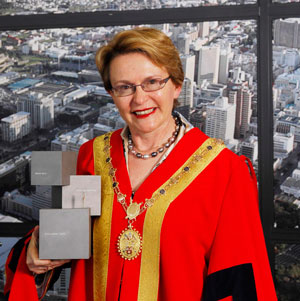 Helen Zille, Mayor of Cape Town, awarded the 2008 World Mayor Prize Helen Zille, Mayor of Cape Town, awarded the 2008 World Mayor Prize
Cape Town Mayor from 2006 to 2009; Prime Minister of the Western Cape Provice from 2009 to date: Helen Zille, Executive Mayor of Cape Town and leader of South Africa’s opposition Democratic Alliance, was awarded the 2008 World Mayor Prize. Commentators supporting her nomination said that in a country devoid of present-day role models, this amazing lady was making a difference and giving people there hope: “Her only equals are Desmond Tutu and Nelson Mandela in Southern Africa.”
As Mayor of Cape Town, South Africa’s legislative capital and leading tourist destination, Helen Zille overcame an aborted attempt by the provincial government to downgrade her office and an attempted coalition coup since her election in March 2006. Elected as leader of the opposition Democratic Alliance, with a background as a provincial and national legislator behind her, she was a finalist for South African Woman of the Year in 2003.
Zille’s role in public life began with a stint as political correspondent for the Rand Daily Mail, South Africa’s leading liberal newspaper during the apartheid era. While at the paper, she emerged as a leading anti-apartheid critic, famously exposing the circumstances behind Steve Biko’s death under police custody in 1977, which was claimed to have been as a result of self-inflicted wounds. She also made her name for herself at the height of apartheid as a member of the Black Sash white women’s resistance movement and as a peace activist in her adopted city of Cape Town. She then worked in public affairs as a public policy consultant and as director of communications for the University of Cape Town. MORE
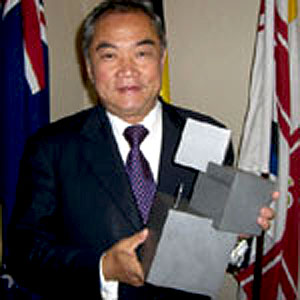 John So, Lord Mayor of Melbourne, awarded the 2006 World Mayor Prize John So, Lord Mayor of Melbourne, awarded the 2006 World Mayor Prize
Melbourne Mayor from 2001 to 2008: John So, Lord Mayor of Melbourne, was awarded the 2006 World Mayor Prize. Melbourne’s longest serving and first elected Lord Mayor John So has been viewed as a positive symbol of diversity in Australian public life. Elected to a second term in 2004, the affection shown for Mayor So in the Victoria state capital has even manifested itself in a tribute record, possibly the first city leader to enjoy ‘cult status’. So is widely accredited with the successful staging of the 2006 Commonwealth Games and his assiduous efforts to promote the city abroad.
The Mayor was also held up as an immigrant success story. Not many mayors can claim to have had a record made in their honour or a t-shirt proclaiming their name across residents’ chests (the ‘John So – he’s my bro’ garment, which was also the record’s title). As a mayor of Asian heritage in the strongly diverse city, Mayor So championed links with other Asian cities, emphasising sister city relations with Osaka, Japan and Tianjin, China and working within the Business Partner City Network of 12 global cities. Melbourne is Australia’s second largest city and describes itself as the nation’s cultural capital, though its prominence as a financial centre is undisputable. As mayor, one of John So’s aims was to engage with young people and to make sure they know they are a vital part of Melbourne society. He has succeeded. One young Melbournian wrote: “John So has captured the imagination of the people of his city. He has especially done so with young people. Where else in the world do people under 25 cheer and stamp and shout out the name of the mayor?” MORE
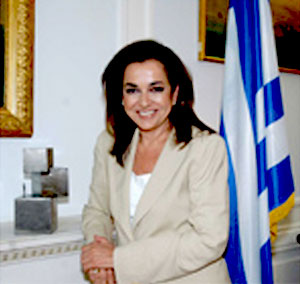 Dora Bakoyannis, Mayor of Athens, awarded the 2005 World Mayor Prize Dora Bakoyannis, Mayor of Athens, awarded the 2005 World Mayor Prize
Athens Mayor from 2003 to 2006; Foreign Minister of Greece from 2006 to 2009: Dora Bakoyannis, Mayor of Athens, received the 2005 World Mayor. Dora Bakoyannis, Mayor of Athens, was not only strongly and passionately supported by her own community but also by thousands of voters in other European countries, North America and Australia. Her achievements as Mayor of Athens, including the successful staging of the 2004 Olympics and her fight against terrorism, have made her a heroine of modern Greek politics. She has also gone beyond the Olympic legacy and used her vision to transform the city and make tangible changes for the benefit of its residents, with plaudits from supporters and opponents alike. In February 2006, Dora Bakoyannis was appointed Greece's first female Foreign Minister. MORE
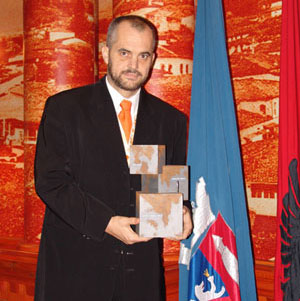 Edi Rama, Mayor of Tirana awarded the 2004 World Mayor Prize Edi Rama, Mayor of Tirana awarded the 2004 World Mayor Prize
Tirana Mayor from 2000 to 2011; Prime Minister of Albania from 2013 to date: The journey of Edi Rama, winner of the 2004 World Mayor Prize, to the mayor’s office in Tirana, the capital of Albania, arguably began in what most would call a raw and rough-and-tumble way inasmuch as, even though he, while still teaching at the Albanian Academy of Arts – admittedly a site of political ferment after the termination of communism and the birth of the Democratic Party in 1990 – had quickly left what he considered a bogus movement, and was doing no more than criticize both the socialists and the democrats in print, someone showed how seriously they took that by lying in wait for him in front of his home and beating him nearly to death. Mr. Rama was in no doubt that his attackers that night in 1997 were sent by then-president Sali Berisha.
When he had finally regained his health, Edi Rama resumed his career as a painter and sculptor in Paris, but returned to Albania in 1998 when his father died, and after a new government under Fatos Nano had assumed power. The country then was the product of half a century of Stalinist dictatorship topped off with ten years of free market indiscipline, and layered with organized crime. The capital itself was mired in the waste of under-served overpopulation, with corruption in the civil service having facilitated the emergence of a chaos of illegal buildings and decaying streets. MORE
|
|
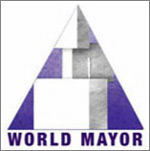
The World Mayor Prize was first awarded in 2004 to the Mayor of Tirana. Since then it has been presented to the mayors of Athens, Melbourne, Cape Town, Mexico City, Bilbao and Calgary

Introducing
World Mayor
The philanthropic City Mayors Foundation awards the World Mayor Prize every two years to a mayor who has made outstanding contributions to his / her community and has developed a vision for urban living and working that is relevant to towns and cities across the world. The Prize has been awarded since 2004.
Anyone voting for a mayor is also asked to consider whether his / her candidate is likely to agree to the City Mayors Code of Ethics. Mayors wishing to be considered for the World Mayor Prize will be asked to sign up to the Code.
Votes must be accompanied by a thoughtful supporting statement.
2014/15 Timetable
First-round nominations were accepted until the middle of May 2014. A longlist of 121 candidates was published on 22 May. A shortlist of 26 nominees was announced on 18 June 2014. A second round of voting will take place between now and the middle of October. The winner of the 2014 World Mayor Prize and other results of the World Mayor Project were announced on 3 February 2015.
Background
The philanthropic City Mayors Foundation, the international think tank on urban affairs, organises the World Mayor Project and awards the World Mayor Prize. The Prize, which has been given since 2004, honours mayors with the vision, passion and skills to make their cities incredible places to live in, work in and visit. The World Mayor Project aims to show what outstanding mayors can achieve and raise their profiles nationally and internationally.
Criteria
The organisers of the World Mayor Project are looking for city leaders who excel in qualities like: leadership and vision, management abilities and integrity, social and economic awareness, ability to provide security and to protect the environment as well as the will and ability to foster good relations between communities from different cultural, racial and social backgrounds. Mayors wishing to be considered for the World Mayor Prize will be asked to sign up to the City Mayors Code of Ethics.
The winner receives the artistically acclaimed World Mayor trophy, while the runner-up is given the World Mayor Commendation.
Winners and runners-up
2004 to 2014
In 2014: Winner: Naheed Nenshi (Calgary, Canada); First runner-up: Daniël Termont (Ghent, Belgium); Second runner-up: Tri Rismaharini (Surabaya, Indonesia)
In 2012: Winner: Iñaki Azkuna (Bilbao, Spain); Runner-up: Lisa Scaffidi (Perth, Australia); In third place: Joko Widodo (Surakarta, Indonesia)
In 2010: Winner: Marcelo Ebrard (Mexico City, Mexico); Runner-up: Mick Cornett (Oklahoma City, USA); In third place: Domenico Lucano (Riace, Italy)
In 2008: Winner: Helen Zille (Cape Town, South Africa); Runner up: Elmar Ledergerber (Zurich, Switzerland); In third place: Leopoldo López (Chacao, Venezuela)
In 2006: Winner: John So (Melbourne, Australia); Runner up: Job Cohen (Amsterdam, Netherland); In third place: Stephen Reed (Harrisburg, USA)
In 2005: Winner: Dora Bakoyannis (Athens, Greece); Runner-up: Hazel McCallion (Mississauga, Canada); In third place: Alvaro Arzú (Guatemala City, Guatemala)
In 2004: Winner: Edi Rama (Tirana, Albania); Runner-up: Andrés Manuel López Obrador (Mexico City, Mexico); In third place: Walter Veltroni (Rome, Italy)
|

















 Naheed Nenshi, Mayor of Calgary, Canada, awarded the 2014 World Mayor Prize
Naheed Nenshi, Mayor of Calgary, Canada, awarded the 2014 World Mayor Prize Iñaki Azkuna, Mayor of Bilbao, Spain, awarded the 2012 World Mayor Prize
Iñaki Azkuna, Mayor of Bilbao, Spain, awarded the 2012 World Mayor Prize Marcelo Ebrard, Mayor of Mexico City, awarded the 2010 World Mayor Prize
Marcelo Ebrard, Mayor of Mexico City, awarded the 2010 World Mayor Prize Helen Zille, Mayor of Cape Town, awarded the 2008 World Mayor Prize
Helen Zille, Mayor of Cape Town, awarded the 2008 World Mayor Prize John So, Lord Mayor of Melbourne, awarded the 2006 World Mayor Prize
John So, Lord Mayor of Melbourne, awarded the 2006 World Mayor Prize Dora Bakoyannis, Mayor of Athens, awarded the 2005 World Mayor Prize
Dora Bakoyannis, Mayor of Athens, awarded the 2005 World Mayor Prize Edi Rama, Mayor of Tirana awarded the 2004 World Mayor Prize
Edi Rama, Mayor of Tirana awarded the 2004 World Mayor Prize